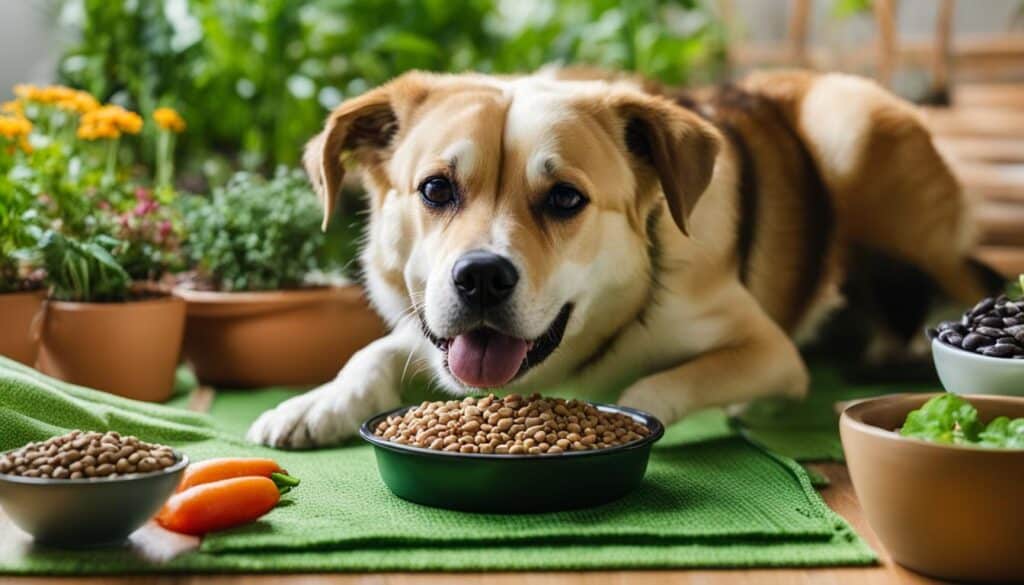Nutritional Analysis: Can Dogs Eat Black Eyed Peas?

Black eyed peas are a popular legume enjoyed by many humans, but can dogs safely consume them as well? In this article, we will explore the nutritional analysis of black eyed peas and their suitability for canine consumption.
According to various sources, black eyed peas are safe for dogs to consume in moderation. They offer a range of nutritional benefits that can support your furry friend’s overall health and well-being.
Key Takeaways:
- Black eyed peas are safe for dogs to eat in moderation.
- They are a great source of protein, fiber, and essential vitamins and minerals.
- Black eyed peas provide energy, support digestion, and help maintain a healthy immune system.
- It is important to avoid seasonings or additives when serving black eyed peas to dogs.
- Introduce black eyed peas gradually into your dog’s diet and monitor their response.
The Benefits of Black Eyed Peas for Dogs
Black eyed peas offer various health benefits for dogs. They are a good source of plant-based protein, which is essential for muscle development and repair. The fiber content in black eyed peas can aid in proper digestion and regulate bowel movements. Additionally, black eyed peas contain folate, which plays a vital role in the production of red blood cells, and potassium, which helps maintain healthy heart function and proper muscle contraction. The iron found in black eyed peas supports oxygen transportation throughout the body and helps prevent anemia in dogs.
“Black eyed peas are a nutritious addition to a dog’s diet and provide essential nutrients like protein, fiber, and minerals.” – Dr. Sarah Johnson, Veterinarian
Incorporating black eyed peas into your dog’s meals can provide them with a wholesome and balanced diet. Here are some key benefits of feeding black eyed peas to your furry friend:
- Rich in Protein: Dogs require protein for growth, repair, and overall health. Black eyed peas offer a plant-based protein source that can fulfill your dog’s dietary needs, especially if they have specific protein restrictions or preferences.
- Promote Digestive Health: The fiber content in black eyed peas can aid in digestion by promoting regular bowel movements and preventing constipation. It can also support the growth of beneficial gut bacteria, improving your dog’s overall gut health.
- Vitamins and Minerals: Black eyed peas are packed with essential vitamins and minerals that contribute to your dog’s overall well-being. These include folate, potassium, and iron, which are important for red blood cell production, heart health, and oxygen transportation in the body.
- Energy Boost: Black eyed peas provide a source of sustained energy for active dogs. The complex carbohydrates present in these peas release energy slowly, keeping your dog energized throughout the day.
When introducing black eyed peas into your dog’s diet, start with small portions and gradually increase the amount over time. This can help prevent any digestive upset or intolerance. Always consult with your veterinarian to determine the appropriate serving size for your dog based on their size, age, and specific dietary needs.
How to Incorporate Black Eyed Peas into Your Dog’s Diet
When it comes to feeding black eyed peas to dogs, proper preparation is key. Follow these steps to incorporate black eyed peas into your dog’s diet:
- Soak dried black eyed peas overnight: Before cooking the black eyed peas, soak them in water overnight. This will help soften them and make them easier to digest for your dog.
- Cook thoroughly: It is important to cook the black eyed peas thoroughly to ensure they are safe for your dog to consume. Soft, well-cooked peas are easier for your dog to chew and digest.
- Avoid additives: When cooking black eyed peas for your dog, avoid using excessive salt, spices, or oil. These additives can be harmful to your pet’s health.
- Serve plain and in small portions: Serve the black eyed peas plain without any seasonings or additives. Start by offering small portions as a complementary addition to your dog’s regular diet.
- Consult your veterinarian: It is always a good idea to consult with your veterinarian before adding any new food to your dog’s diet. They can provide guidance on the appropriate serving size based on your dog’s size, weight, and specific dietary needs.
Introducing black eyed peas gradually into your dog’s diet allows you to monitor their reaction and ensure they tolerate the new food well. Remember, every dog is different, and some dogs may have sensitivities or allergies to certain foods. If you notice any signs of digestive upset or discomfort after feeding black eyed peas to your dog, discontinue the introduction and consult with your veterinarian for further guidance.
Feeding black eyed peas to dogs can be a nutritious and enjoyable addition to their diet when done properly. Remember to prioritize your dog’s health and well-being by following the guidelines above and seeking professional advice when needed.

Conclusion
In conclusion, black eyed peas can be a nutritious and safe addition to your dog’s diet when prepared and served properly. These humble legumes offer a wealth of valuable nutrients, including protein, fiber, folate, potassium, and iron, which contribute to your furry friend’s overall health and well-being.
However, it is important to introduce black eyed peas gradually into your dog’s diet, as with any new food, to avoid any potential digestive issues. Monitor your dog’s response closely and consult with your veterinarian if you notice any adverse reactions.
Remember, every dog is unique, and individual dietary needs may vary. Therefore, it is always recommended to seek professional advice from your veterinarian before making any significant changes to your dog’s diet. They can provide personalized guidance based on your dog’s age, size, breed, and any specific health conditions they may have.
FAQ
Can dogs eat black eyed peas?
Yes, black eyed peas are safe for dogs to consume in moderation.
What are the benefits of black eyed peas for dogs?
Black eyed peas are a good source of protein, fiber, folate, potassium, and iron, providing various health benefits such as supporting muscle development, aiding digestion, and promoting a healthy immune system.
How can I incorporate black eyed peas into my dog’s diet?
It is important to cook black eyed peas thoroughly and serve them plain, without any seasonings or additives. Soak dried black eyed peas overnight before cooking them, and introduce them gradually into your dog’s diet in small portions.
Are black eyed peas safe for dogs?
Yes, black eyed peas are generally safe for dogs to consume. However, it is crucial to monitor your dog for any signs of digestive upset and consult with your veterinarian before adding any new foods to their diet.






